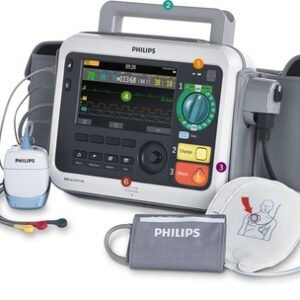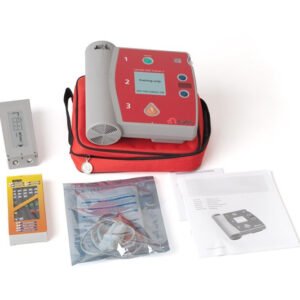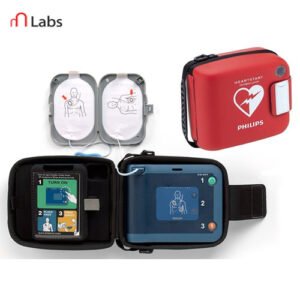AED WALL CABINET WITH ALARM
- Economical Design
- Smooth finish
- Easy to Install
- Alarmed cabinet
- Very Loud Alarm!!
- Fits most brands of AED’s
- 1/8″ thick clear acrylic window
- Includes 2 keys to arm/disarm alarm (AED cabinet does not lock)
- AED cabinet alarm requires 1- 9-volt battery (included)
- AED cabinet alarm is beasily attached to existing building alarm system
- Extra Keys are available!
EFFICIA DEFIBRILLATOR/ MONITOR
BRAND – mLabs
OPERATION MODE – Automatic
TYPES – Implantable Cardioverter Defibrillators
USAGE/APPLICATION – Home & Public Place
BATTERY TYPE – Lithium
LAERDAL AED TRAINER 2
BRAND – mLabs
Affordable training through the simulation of the HeartStart FR2 AED in appearance and operation
Added instructor flexibility through unique control of the scenario selection by use of the remote control device
Flexible configuration of the device through a scenario builder program that allows the additional creation of custom training scenarios. Cost-effective operation through use of six C-cell batteries
PHILIPS HEART START FRX DEFIBRILLATOR
BRAND – PHILIPS
OPERATION MODE – Automatic
TYPES – Implantable Cardioverter Defibrillators
DISPLAY TYPE – Digital
ALARM SYSTEM – Yes
USAGE/APPLICATION – Home & Public Place
BATTERY TYPE – Lithium
PHILIPS HEARTSTART ONSITE/HS1 DEFIBRILLATOR
BRAND – PHILIPS
| Kit Contents | Defibrillator, battery (one, pre-installed), SMART Pads (one set, pre-installed), set-up/maintenance guide with expiration date tags, owner’s manual, quick reference guide |
| Waveform | SMART Truncated exponential biphasic. Waveform parameters adjusted as a function of patient impedance |
| Defibrillation peak current – Adult | 32 A (150 J nominal) into a 50 ohm load |
| Defibrillation peak current – Pediatric | 19 A (50 J nominal) into a 50 ohm load (using optional infant/child SMART Pads Cartridge) |
| Shock-to-Shock Cycle Time | Typically less than 20 seconds between shocks in a series |
| Quick Shock | Able to deliver a shock after the end of a CPR interval, typically in eight seconds |





